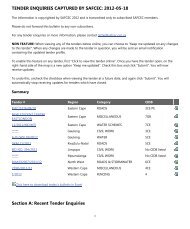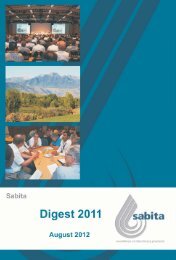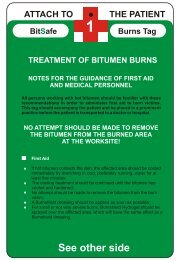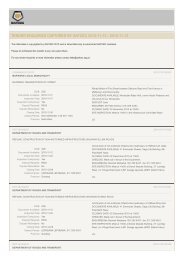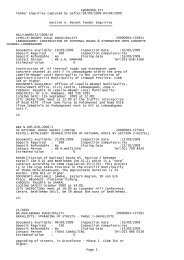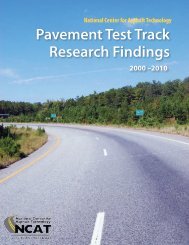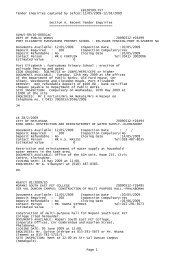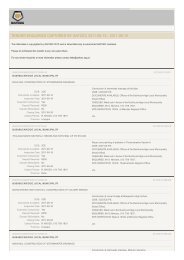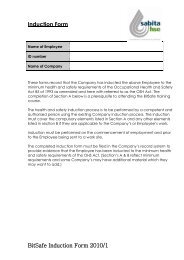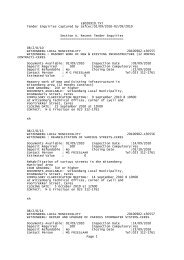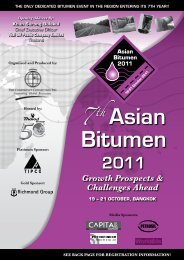DIGEST 2006 - Sabita
DIGEST 2006 - Sabita
DIGEST 2006 - Sabita
You also want an ePaper? Increase the reach of your titles
YUMPU automatically turns print PDFs into web optimized ePapers that Google loves.
designed to assist road authorities<br />
in the selection of proven<br />
substitutes for carcinogenic and<br />
environmentally aggressive coal<br />
tar products. The guideline focuses<br />
on priming granular bases and<br />
precoating surfacing stone, and is<br />
intended to serve as an interim<br />
guideline until documents such as<br />
the outdated TRH1: Prime coats<br />
and bituminous curing membranes<br />
(1986) have been updated.<br />
Despite <strong>Sabita</strong>’s<br />
wide-ranging<br />
awareness campaign,<br />
and the lead taken by<br />
the South African<br />
National Roads<br />
Agency Limited<br />
(SANRAL), the<br />
Provincial Council<br />
Western Cape and<br />
the Gauteng<br />
Department of Public<br />
Transport, Roads and<br />
Works, none of South<br />
Africa’s 248 municipalities nor any<br />
of the six metropolitan councils<br />
have yet undertaken to prohibit<br />
the use of coal tar products in<br />
their road infrastructure projects.<br />
This is a problem demanding<br />
incisive action, as it is<br />
inconceivable that professional<br />
engineers should continue to allow<br />
environmentally harmful and<br />
unhealthy products to be specified<br />
for road construction when there<br />
is widespread substitution of this<br />
product with alternatives that are<br />
less harmful to workers or the<br />
environment.<br />
Another initiative to advance the<br />
introduction of global norms and<br />
standards in South Africa is the<br />
introduction of the first plenary<br />
session, Health, Safety and the<br />
Environment (HSE), at CAPSA’07<br />
this year. This session, convened<br />
within the context of the COSHEC<br />
business plan, will have<br />
distinguished speakers from<br />
Europe and the USA presenting<br />
up-to-date papers on topics<br />
covering legislation on the<br />
registration, evaluation and<br />
assessment of chemical<br />
substances, the<br />
challenges faced<br />
and dealt with by<br />
the asphalt<br />
industry in both<br />
Europe and the<br />
USA to meet the<br />
needs of society in<br />
respect of HSE,<br />
and future<br />
industrial trends<br />
to ensure that<br />
processes are<br />
sustainable and<br />
appropriate to<br />
reduced reliance on nonrenewable<br />
energy resources.<br />
No<br />
municipalities<br />
have yet<br />
undertaken<br />
to prohibit<br />
the use of<br />
coal tar<br />
products<br />
Workplace safety<br />
To mitigate employee exposure to<br />
injury or ill-health arising from the<br />
handling of bituminous products,<br />
<strong>Sabita</strong> recently launched a<br />
bitumen safety course, which<br />
kicked off in June <strong>2006</strong> when 25<br />
employees from member<br />
companies took part in the BitSafe<br />
train-the-trainers courses in<br />
Stellenbosch, Johannesburg and<br />
Durban. These trainers will now<br />
head up comprehensive training<br />
courses at their own companies to<br />
entrench awareness of the hazards<br />
associated with the handling of<br />
bituminous binders, and to<br />
32



